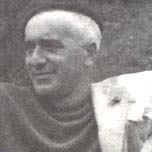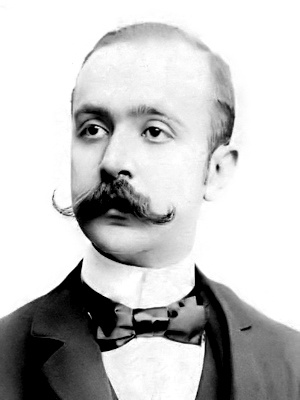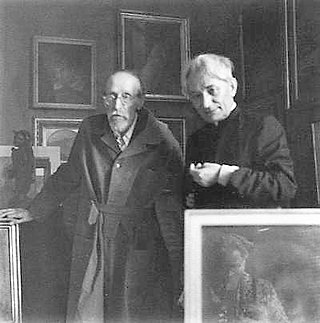Related Research Articles

General Gabriele D'Annunzio, Prince of Montenevoso, sometimes written d'Annunzio as he used to sign himself, was an Italian poet, playwright, orator, journalist, aristocrat, and Royal Italian Army officer during World War I. He occupied a prominent place in Italian literature from 1889 to 1910 and in its political life from 1914 to 1924. He was often referred to by the epithets il Vate and il Profeta.

Luigi Ballerini is an Italian writer, poet, and translator.

Giovanni Papini was an Italian journalist, essayist, novelist, short story writer, poet, literary critic, and philosopher. A controversial literary figure of the early and mid-twentieth century, he was the earliest and most enthusiastic representative and promoter of Italian pragmatism. Papini was admired for his writing style and engaged in heated polemics. Involved with avant-garde movements such as futurism and post-decadentism, he moved from one political and philosophical position to another, always dissatisfied and uneasy: he converted from anti-clericalism and atheism to Catholicism, and went from convinced interventionism – before 1915 – to an aversion to war. In the 1930s, after moving from individualism to conservatism, he finally became a fascist, while maintaining an aversion to Nazism.
Giuseppe Tarantino was an Italian philosopher, professor of moral philosophy and pedagogy and rector at the University of Pisa, Italy.

Giovanni Comisso was an important Italian writer of the twentieth century, appreciated by Eugenio Montale, Umberto Saba, Gianfranco Contini and many others.

Giuseppe Spataro was an Italian politician.

Giuseppe Prezzolini was an Italian literary critic, journalist, editor and writer. He later became an American citizen.

Federico De Roberto was an Italian writer, who became well known for his historical novel I Viceré (1894), translated as The Viceroys.

Arnoldo Foà was an Italian actor, voice actor, theatre director, singer and writer. He appeared in more than 130 films between 1938 and 2014.

Ida Di Benedetto is an Italian actress and producer.

Le inchieste del commissario Maigret is an Italian television series based on the detective fiction of Georges Simenon about the French police commissaire Jules Maigret, portrayed by Gino Cervi, directed by Mario Landi, in sixteen episodes, produced by RAI. Shot in black and white, the series was very successful: the last season (1972) was followed by eighteen and a half million viewers.
Caterina Vertova is an Italian actress. She studied in London and in Paris, as well as at the Actors Studio in New York City.

Giordano Bruno Guerri is an Italian historian, writer, and journalist. He is an important scholar of twentieth-century Italy, in particular of the Fascist period and the relationship between Italians and the Catholic Church.

Giammarco Menga is an Italian sports journalist and author.
Angela Bianca Tragni is an Italian journalist and writer. Over her career, she carried out research in the culture of the Italian region Apulia and folklore of Southern Italy. She also wrote books on history, especially the Middle Ages.

Giorgio Ficara is an Italian essayist and literary critic. He is Full Professor of Italian Literature at the University of Turin.

Alessandro Gerbi, known as Sandro is an Italian journalist, author of several biographies and books on Italian contemporary history.

Omero Vecchi, known by his pen name Luciano Folgore, was an Italian poet.

Cesare Angelini was an Italian presbyter, writer and literary critic.
Giuseppe Balducci is an Italian literary critic.
References
- ↑ "Il saggio di Balducci. E così il potere ci mise la maschera e ci tolse l'identità" (PDF). Libero . March 13, 2022. Retrieved June 29, 2023.
- ↑ Mughini, Giampiero (April 12, 2023). "La versione di Mughini". Dagospia. Retrieved June 29, 2023.
- ↑ ""Sotto la cupola del vero" sulla strada della Tradizione" – via www.barbadillo.it.
- ↑ Torno, Armando (August 6, 2023). "Immortali con il sangue del povero toro" (PDF). Domenica - Il Sole 24 Ore. Retrieved August 10, 2023.
- ↑ Marcenaro, Giuseppe (March 12, 2023). "Mario Praz, passeggiate romane nel degrado e ritratti di antiquari (con i tic)". Alias - il manifesto . Retrieved June 29, 2023.
- ↑ Berardinelli, Alfonso (May 11, 2023). "Il gioco degli antiquari con il tempo secondo Mario Praz". Il Foglio. Retrieved July 5, 2023.
- ↑ "Presentazione del libro di Mario Praz Omelette soufflée à l'antiquaire (Aragno editore)" . Retrieved October 16, 2023– via www.radioradicale.it.
- ↑ Torno, Armando (June 4, 2023). "Nobili vampiri tra miti e schemi letterari". Domenica - Il Sole 24 Ore. Retrieved June 29, 2023.
- ↑ "Joris-Karl Huysmans e Georges Bordonove. Due libri su Gilles De Rais (Aragno e Jouvence)" – via www.raiplaysound.it.
- ↑ Brullo, Davide (April 12, 2023). "Sia lodato Montherlant l'ultimo (im)moralista". Il Giornale . Retrieved June 29, 2023.
- ↑ Balducci, Giovanni and Giuseppe (August 5, 2022). "D'Annunzio nelle immortali pagine della Recherche". Il Sole 24 Ore. Retrieved June 28, 2023.
- ↑ Scaraffia, Giuseppe (August 14, 2022). "Alle sorgenti della 'Recherche'" (PDF). Domenica - Il Sole 24 Ore. p. V.
- ↑ "Marcel Proust. Soggiorno a Venezia. D'Annunzio nella Recherche: un inedito – TG2" – via www.youtube.com.